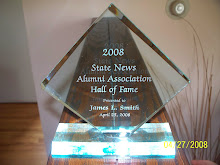When AnnArbor.com talked about bringing bloggers into the fold of its new (now delayed) launch, most of us assumed they were talking about experienced (well, as experienced as the new technology allows) bloggers.
The first A2 blog I've found - a wine blog - appears to be a local Ann Arbor wine expert who is apparently going to learn how to write as the site comes on line.
"It's Just Grape Juice," created in July 2009, appears to be the "wine blog" for AnnArbor.com. Clearly the author is a wine expert, but the long rambling sentences and large blocks of type don't bode well for a very readable blog.
It's hard to criticize this because this is not someone I know or have ever read before, but a good editor would have been helpful in this effort. Although my blog criticizes editors, it is not because editors are not important, but because they are crucial parts of the process. That's why good editors are so important.
To be clear, it is not my intention to run down this blog or the expertise of the writer, it is clear that he knows his stuff. My point is that he has been thrust into a position of writing about it, and despite what most people think, there is a certain amount of skill and expertise involved in written communication, just as there must be in selecting a fine wine.
A competent editor would have punched up the lead of this blog, shortened the sentences and paragraphs and tried to focus the wine column in a crisp, precise way. When there is a worry about what "new journalism" will bring, it is precisely this kind of writing most of us are talking about.
Personal pronouns become troublesome in writing and there are plenty of "I's" in the wine column. Before AnnArbor.com gives the keys to the car to these bloggers, maybe they should hold a few Journalism 101 classes.
Communication, even in the new age of technology, is going to require decent writing skills.
And one other part of this new blog raises another concern. Apparently the author of this blog is a principal in a company that owns or operates a series of restaurants. Not saying he will, but will the writer slant columns to favor or benefit his own company and who at AnnArbor.com will monitor that?
Friday, July 17, 2009
Subscribe to:
Post Comments (Atom)


6 comments:
Perhaps an editor should go in and see to it that myself is spelled as one word, not two.
The potential conflicts of interest go beyond promoting his own company. His annarbor.com platform will provide a soapbox that he can use to give or demand all sorts of favors from people he does business with in his paid job -- and no editor could possibly monitor that. This is "citizen journalism"?
Yup.
"Here's a crate of free wine. Do what you want w/ it: drink it, sell it, give it away, whatever, as long as you promote it for me on your blog."
I'd bet you a pica pole, a proportion wheel and a green eyeshade that this wine blogger will be buried in free cases of wine unless there are contols in place. The managers of AnnArbor.com should clearly state what their policy is, vis a vis how much graft their unpaid bloggers can accept. (The answer should be zero.)
Jim, will you put an "e" on the end of premier in your headline? Premier means premium or among the best, premiere means debut. Thanks.
Inky, thanks, fixed. As I continually say, I'm only free from editors, but still in need of a good one.
Just want to be clear that I don't know what this new wine blogger will do. But the idea of special bloggers, with identifiable special interests, presents a challenge to time honored newspaper ethics.
I'm a little nervous about judging the motivations of this particular person, because I don't know them.
I do know that he desperately needs a good editor, as all writers do, me included.
In an effort to protect consumers, the FTC is already looking at bloggers and how they are compensated. They are scrutinizing how bloggers are working with firms that provide free products, firms that pay bloggers to write favorable reviews and other issues regarding transparency.
Many bloggers are making a killing in freebies and pay-to-post. They have no more place in the editorial section of a legitimate news provider than a snake oil salesman, yet many editors/content directors aren't asking tough questions because the the copy is free.
Readers have a right to know if a blogger received, say, a case of wine for review. Then the reader can decide if he/she wants to trust the blogger.
This plagued dead-tree journalism, too. Papers that were too cheap to hire a good travel writer but wanted content to preserve the ad revenue from the airlines and travel agencies just bought freelance copy. Many of these freelance writers accepted free junkets by the very venues they were writing about in exchange for glowing reviews. Readers had no idea they were mulling vacation plans based on a story that was purely pay-to-pay.
It was the newspaper industry's version of "don't ask don't tell."
Not to single out AnnArbor.com, but it could establish some leadership and credibility by proactively refusing to use bloggers who accept freebies from manufacturers, service providers, etc. But that takes a lot of policing, and it would mean that the "publication" would have to buy wine, beer, restaurant meals and anything blogged about. Will that happen in these low-budget times?
Post a Comment